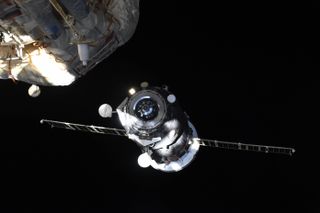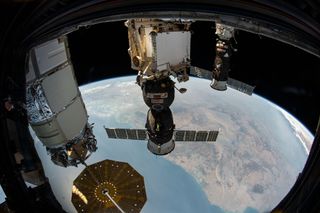Russia wants to speed up space station cargo deliveries with shorter, one-orbit flights
A delivery will take just two hours with the new proposal.

Roscosmos wants to speed up its deliveries to the International Space Station.
The Russian space agency released a proposal to allow its Progress cargo ships to arrive in a single orbit, which would mean stuff would arrive at the orbiting complex just two hours after launch, the agency said.
A statement on Roscosmos' website says the Rocket and Space Corporation Energia (a part of the space agency) received a patent Nov. 12 for a single-orbit cargo flight.
Related: How Russia's Progress spaceships work (infographic)
Testing of some elements began before the patent was issued, during the Progress MS-17 cargo flight in June and July 2021, Roscosmos stated, without providing further detail. More testing is expected in June 2022 during Progress MS-20.
"Single-orbit scheme Progress flight to the ISS is to be implemented from 2023," Roscosmos added. That timeline assumes that all testing goes to plan and that the new orbit is approved.

It's not the first time Roscosmos has tweaked orbital timings. Both Progress and the crewed Soyuz ships were allowed to fly to the International Space Station using a four-orbit (six-hour) flight plan starting in 2012 and 2013, respectively, Roscosmos said.
Get the Space.com Newsletter
Breaking space news, the latest updates on rocket launches, skywatching events and more!
The shorter timespan was especially useful for crews, Roscosmos stated, as it "allowed cosmonauts to get used to the adverse factors of weightlessness in comfortable conditions on the ISS."
Then in 2018 and 2020, respectively, Progress and Soyuz vehicles were allowed to use a two-orbit flight plan that brought cargo and people to the space station in about three hours. The fastest crewed flight to date, according to Roscosmos, was the Soyuz MS-17 spacecraft that sent a crew to the ISS just three hours, three minutes and 37 seconds after launch in October 2020.
Follow Elizabeth Howell on Twitter @howellspace. Follow us on Twitter @Spacedotcom or on Facebook.
Join our Space Forums to keep talking space on the latest missions, night sky and more! And if you have a news tip, correction or comment, let us know at: community@space.com.

Elizabeth Howell (she/her), Ph.D., is a staff writer in the spaceflight channel since 2022 covering diversity, education and gaming as well. She was contributing writer for Space.com for 10 years before joining full-time. Elizabeth's reporting includes multiple exclusives with the White House and Office of the Vice-President of the United States, an exclusive conversation with aspiring space tourist (and NSYNC bassist) Lance Bass, speaking several times with the International Space Station, witnessing five human spaceflight launches on two continents, flying parabolic, working inside a spacesuit, and participating in a simulated Mars mission. Her latest book, "Why Am I Taller?", is co-written with astronaut Dave Williams. Elizabeth holds a Ph.D. and M.Sc. in Space Studies from the University of North Dakota, a Bachelor of Journalism from Canada's Carleton University and a Bachelor of History from Canada's Athabasca University. Elizabeth is also a post-secondary instructor in communications and science at several institutions since 2015; her experience includes developing and teaching an astronomy course at Canada's Algonquin College (with Indigenous content as well) to more than 1,000 students since 2020. Elizabeth first got interested in space after watching the movie Apollo 13 in 1996, and still wants to be an astronaut someday. Mastodon: https://qoto.org/@howellspace
